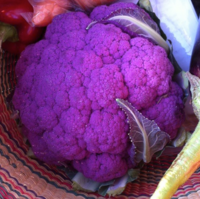
Photo from wikipedia
One of the main problems encountered after fresh-cutting of foods is enzymatic browning causing changes in the texture, taste, and color. The variety of physical and chemical-based antibrowning methods was… Click to show full abstract
One of the main problems encountered after fresh-cutting of foods is enzymatic browning causing changes in the texture, taste, and color. The variety of physical and chemical-based antibrowning methods was applied to extend the shelf life of these products. Accordingly, methods using natural compounds are of great importance for health. In this study, it was aimed to prevent enzymatic browning in potato (Solanum tuberosum L. cv. Marfona) by limiting the polyphenol oxidase (PPO) activity with selected flavonoids. First of all, we purified the potato PPO (pPPO) by single-step affinity chromatography. Sodium dodecyl sulfate polyacrylamide gel electrophoresis (SDS-PAGE) and native PAGE were applied on pPPO. Then, the inhibition effects of 7-hydroxyflavone, 7-hydroxy-4'-nitroisoflavone, myricetin, luteolin, 7-methoxyflavone, 6-fluoroflavone, diosmetin, rutin, and diosmin on purified PPO enzyme were investigated. Kinetic assays indicated that myricetin was a remarkable inhibitor with the Ki value of 5 µM on pPPO. PRACTICAL APPLICATIONS: Potatoes are one of the important diet in many countries. In the processing of potatoes, enzymatic oxidation catalyzed by polyphenol oxidases (PPOs) is lead to losing its taste, flavor, and color. In this current paper, group-based selected flavonoids were proposed as alternative inhibitors of potato PPO enzyme. These flavonoids allowing to limit the PPO activity are commercially available, and they can be potential candidates to be used as antibrowning agents during potato processing.
Journal Title: Journal of food biochemistry
Year Published: 2021
Link to full text (if available)
Share on Social Media: Sign Up to like & get
recommendations!